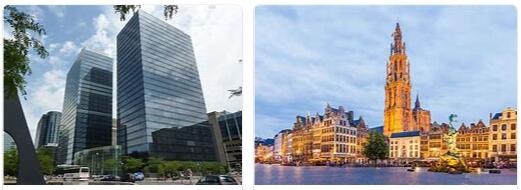The economic development of Belgium has its roots in the frenetic mercantile activity that characterized the bourgeois population of its cities since the beginning of the modern age. This vocation to trade, in common with the neighboring Netherlands and partly due to the strategic position between the French, German and British areas, manifested itself in commercial and manufacturing activities and subsequently made Belgium a particularly fertile territory for the spread of the industrial revolution. starting from the eighteenth century. In this context, the discovery of the rich deposits of hard coal present both in the center and in the north of the country played a key role, which triggered a migratory flow of foreign workers who moved to Belgium from all over Europe to work in the mines. With the advent of the second industrial revolution, in fact, Belgium became one of the most important countries for metallurgical production and assumed a leading position in Europe as regards the development of rail transport. In the same years it also entered the colonial limelight, with the conquest of the African territory of the Belgian Congo (1885), which contributed to the economic development of the country with the influx of minerals and raw materials. In the same period, the first activities of banks and finance appeared. The first half of the twentieth century marked a violent setback for the Belgian economy which, subjected to robbery and destruction of its territory during the two world wars, had to wait for the conclusion of the second to reorganize its entire production system. In fact, the end of the war saw the country become the promoter of a project of economic integration between Belgium itself and the neighboring states of Luxembourg and the Netherlands, which starting from 1948 had formed a political-customs union (Benelux) aimed at greater integration on a political, social and above all economic level. With it, three countries in fact undertook to maintain a communion of intent with regard to foreign policy and to guarantee the free circulation of people, goods and capital on their territory, according to a philosophy that would later be that of the nascent European Union.
In fact, Belgium was also one of the founders of the EEC, and this pro-European vocation was rewarded by the member countries with the designation of its capital as the seat of the governing bodies of the Union. Starting from the 1970s, the State suffered from the crisis in the extractive industry, due to the international rise of oil-producing countries, to which the government reacted by bringing concrete aid to the national economy and redirecting it towards a conspicuous modernization of the other industrial sectors (especially mechanical, metallurgical and chemical). The industrial reconversion was not without consequences: the closure of the steel plants mainly damaged the economy of the Walloon region (in particular the closure of the Clabecq ironworks in Walloon Brabant, with over 2000 employees), although negative economic and social consequences also occurred in Flanders. At the same time, the government’s intervention policy caused a tightening of relations between the two regions of the country, mainly due to the claims of the Walloons, who were convinced that the state-led industrialization process favored the Flemings, leading to the creation of pockets of depression on their territory. In the 1990s, the rise in inflation led to an increase in unemployment, especially in large centers and in the industrial sector (with a net loss of more than 50,000 jobs). Already starting in 1994, however, there was a strong recovery. On the other hand, the progressive importance assumed by the European Union (with the treaties of inflation led to an increase in unemployment, especially in large cities and in the industrial sector (with a net loss of more than 50,000 jobs). Already starting in 1994, however, there was a strong recovery. On the other hand, the progressive importance assumed by the European Union (with the treaties of inflation led to an increase in unemployment, especially in large cities and in the industrial sector (with a net loss of more than 50,000 jobs). Visit behealthybytomorrow.com for EU competition.
Already starting in 1994, however, there was a strong recovery. On the other hand, the progressive importance assumed by the European Union (with the treaties of Maastricht and Schengen first, then with the adoption of the single currency and, in 2004, with the enlargement of the European Union), increased the international role of Brussels, with a consequent development of the management and tertiary activities of the capital, populated by diplomats and bureaucrats. In 2009, GDP was equal to US $ 470,400 million, distributed as a percentage between 0.6% of the primary sector, 21.9% of the secondary sector and 79.8% of the tertiary sector. Since 2001, the economy has been affected by the international slowdown and GDP growth recorded a modest increase of 0.8% between 2002 and 2003 with a slight increase in national unemployment (while inflation remains on contained levels). In the international trade of goods, Belgium holds the 10th place in the world.
